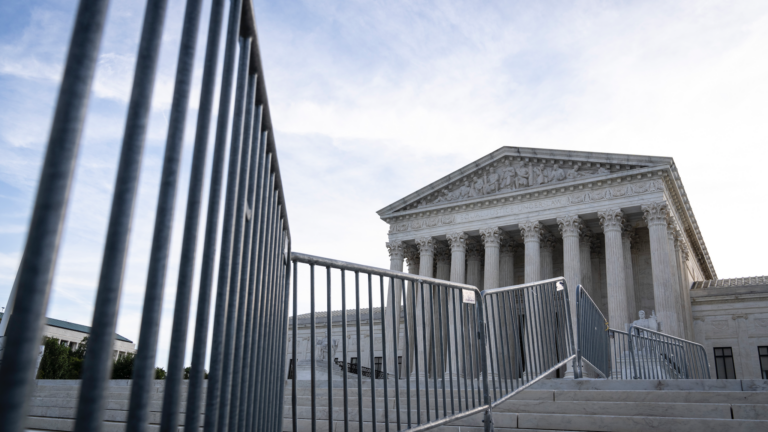Justice Dept. urges Supreme Court to uphold Roe v. Wade
“The United States has a substantial interest in the proper interpretation of the 14th Amendment and principles of stare decisis.”

WASHINGTON — The Justice Department urged the Supreme Court on Monday to reaffirm Roe v. Wade when it hears a case challenging Mississippi’s restrictive abortion law later this year, arguing that any other decision would uphold an unconstitutional law and undermine a doctrine that gives power to Supreme Court precedents.
The department also asked for permission to present oral arguments when the case is heard Dec. 1, an indication of the significance of this particular legal fight in the larger effort to overturn Roe and enact abortion bans across the country.
The briefs, filed by the acting solicitor general, Brian H. Fletcher, are the latest step by the Biden Justice Department to try to protect the legal right to an abortion. They came just weeks after the department sued Texas over a law that prohibits nearly all abortions in the state and asked a federal district judge to temporarily block the statute until the courts determine whether it is constitutional.
The Justice Department was one of more than 40 parties to file a friend-of-the-court brief in support of Jackson Women’s Health Organization, the only abortion provider in Mississippi. In all, more than 140 supporters and detractors of the Mississippi law have filed such briefs this year.
Jackson Women’s Health sued to stop the Mississippi law, which bans abortions after 15 weeks of pregnancy, when it passed in 2018. The clinic argued that the law was unconstitutional because courts have ruled that a woman has the right to terminate a pregnancy before viability, and it has relied on medical experts who have determined that viability takes place at 23 to 24 weeks.
The Justice Department agreed, arguing that the state had been “unable to identify any medical research or data that showed a fetus had reached the ‘point of viability’ at 15 weeks.” And it noted that federal district and appeals courts had sided with Jackson Women’s Health.
ABORTIONS IN TEXAS:
The department also said that in asking the Supreme Court to overrule its precedents on abortion, including Roe v. Wade, Mississippi was asking the court to violate the doctrine of stare decisis, Latin for “to stand by things decided.” That phrase is shorthand for the long-standing principle that the court is to respect precedent.
“The United States has a substantial interest in the proper interpretation of the 14th Amendment and principles of stare decisis,” the Justice Department wrote in its brief.
The Mississippi abortion law is one of several passed in recent years by conservative state legislatures that pose a challenge to Roe, a decision that Mississippi’s attorney general, Lynn Fitch, has called “egregiously wrong.” Fitch has urged the Supreme Court to overturn the decision, which underpins the constitutional right to an abortion, and to uphold the state law.
Abortion opponents are hopeful that the Mississippi case will be the one to undo Roe. It will be heard by a Supreme Court that has a strong conservative majority, including the newest justice, Amy Coney Barrett, who says she personally opposes abortion. Such a ruling would pave the way for other states to essentially ban the procedure.
Even if the Supreme Court upholds the lower-court rulings blocking the Mississippi law, it declined to stop Texas from enacting a law that prohibits most abortions after six weeks of pregnancy. Opponents say the Texas law skirts court precedent on abortion by using civil lawsuits and private citizens to enforce it, rather than the state’s executive branch. The Justice Department has called this mechanism “an unprecedented scheme that seeks to deny women and providers the ability to challenge” the law in court.
Lower courts have blocked the Mississippi law, arguing that it conflicts with multiple Supreme Court precedents. Those courts also rejected Mississippi’s characterization of the law as a “regulation” because it ultimately forbids women “from choosing previability abortions rather than specifying the conditions under which such abortions are to be allowed,” the department wrote in its brief.
Nevertheless, the justices agreed in May to hear the case.